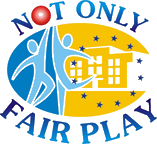
- Home
- Best
Practices - Toolkits
How to ... - Sport
Events - Guidelines
- Information
& Contacts - Project Management
A collection of student stories and initiatives about sport.
This section offers access to a collection of toolkits to promote sport at school.
-
 Physical Education Teachers
They are the main point of reference for students at school
Physical Education Teachers
They are the main point of reference for students at school
-
 Teachers
Teachers of all subjects can contribute to promote sport at school
Teachers
Teachers of all subjects can contribute to promote sport at school
-
 School Directors
Their support is a key element to promote sport at school
School Directors
Their support is a key element to promote sport at school
-
 Resources
A database of resources for teachers, PE teachers and school directors for the promotion of sport at school.
Resources
A database of resources for teachers, PE teachers and school directors for the promotion of sport at school.
Sporting events are organised in each partner country
Guidelines for policy makers willing to raise awareness on the importance of promoting sport in schools
Events
The Not Only Fair Play project has been promoted through conferences and articles.
Partnership
-
 Contractual Partners
From this section it is possible to access a description of each contractual partner of the Not Only Fair Play project.
Contractual Partners
From this section it is possible to access a description of each contractual partner of the Not Only Fair Play project.
-
 Schools
From this section it is possible to access information about the schools involved in the Not Only Fair Play Project in the 9 European countries involved.
Schools
From this section it is possible to access information about the schools involved in the Not Only Fair Play Project in the 9 European countries involved.
-
 Associated Partners
A number of associated partners officially joined the project in order to ensure the project sustainability by continuing to use the project deliverables over the next years.
Associated Partners
A number of associated partners officially joined the project in order to ensure the project sustainability by continuing to use the project deliverables over the next years.
This section of the Not Only Fair Play portal provides administrative information for the project contractual partners and for the European Commission, and is password protected.
Physical Education Teachers
Homepage > Toolkits > Physical Education Teachers

They are the main point of reference for students at school
Back to the Physical Education Teachers Toolkits
Promotion of an ethical approach to sport, including communication strategies with parents
A Toolkit for Physical Education Teacher
Children and adolescents are establishing patterns of behavior that affect both their current and future health. At this age young people are vulnerable, at risk for engaging in tobacco, alcohol, or other drug use etc. However, enhancing the role plyed by protective factors in their lives can help them avoid such risks. Engaging parents in their children’s and adolescents' school life is a promising protective factor. Research shows that parent engagement in schools is closely linked to better student behavior, higher academic achievement, and enhanced social skills. Parent engagement also makes it more likely that children and adolescents will avoid unhealthy behaviors, such as tobacco, alcohol, and other drug use.
This step defines parent engagement in schools, identifies specific strategies and actions that schools can take to increase parent engagement, common ethical issues school and parents have to deal with, ways school staff can connect with parents, solutions for six common challenges to sustaining parent engagement and communication with them on ethical issues.
- The European fair play movementThe site aims to promote fair play and tolerance in the broadest sense (in sports and everyday life) in Europe by supporting its members, helping to promote fair play campaigns where sports organizations take the initiative, co-operating with authorities, communities or parents to foster fair play themes and by facilitating regular contacts between the various European sports organizations.
- Right to playA humanitarian, non-governmental organization committed to improving the lives of the most disadvantaged children and linking them with their communities through sport.
- Anastasios G. Rodis, Swedish Swimmers’ Perception of Parental InvolvementSports plays a significant role in numerous children’s lives. For many children, sports participation is a positive and enjoyable experience, where as for others, sports can become a negative and stressful experience. Children’s sports participation may be influenced by numerous factors but parents seem to be the most important.
- Ethical and safe use of the internetThe material presents the New York libraries policy, which informs teachers, parents and students about the ethical use of information and technology in libraries.
- The Heritage Code of Ethics for Educators and FamiliesIt sets out a framework for reflection about the ethical responsibilities of early childhood professionals and the standards of behaviour expected of all staff and enrolled families.
- ETHICS, USA, Parent Participation Program – Parental InvolvementThe site presents the objectives of the parent participation programme.
- Jeff Haefner, How to Work with Parents the "Right Way" and Avoid Unpleasant ProblemsThe article gives valuable tips that can help PE teachers improve communication with players and their parents. Open communication is the most important tool teachers and coaches have when it comes to working with parents.
- Lindsey C. Blom, Dan Drane, Parents’ Sideline Comments: Exploring the Reality of a Growing IssueThe article states that researchers, PE teachers, parents, coaches, and youth sport administrators have to work together to make sport as fun and rewarding for children as possible. The article examines the effects of various types of comments on students’ behavior in sports.
- Strategies for Involving Parents in School HealthThe study presents strategies for involving and engaging parents in the school activities.
- The Guardian: “Five of the best apps that help teachers communicate with parents”The article presents the best digital tools for getting parents engaged in learning, from instant messages home to performance data at the touch of a button.


